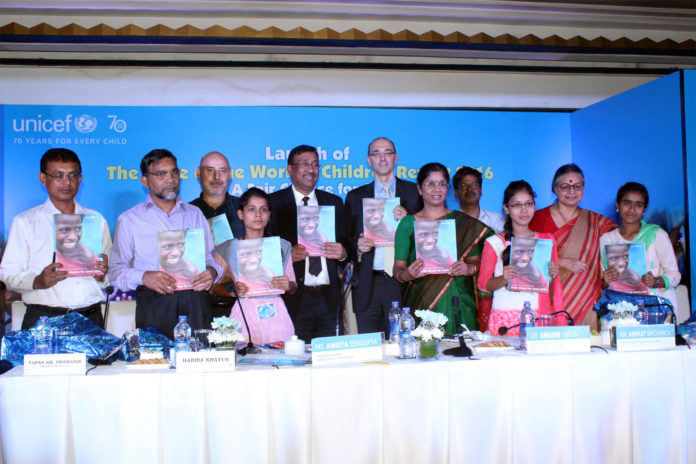Kolkata|
In a keynote address to launch UNICEF’s annual flagship publication, The State of the World’s Children Report, which focuses on the need of giving a ‘Fair Start’ to each and every child across the world, Dr. Shashi Panja, Minister of State, Department of Child Development &Women Development & Social Welfare(Independent Charge) & MoS- Department of Health & Family Welfare ,GoWB, informed that WB’s progress has been the most satisfactory of all states in the country schools registering cent percent admission, while successfully curbing attrition rate.
She held up Sarva Shiksha Abhiyan and implementation of the Right to Education Act specially school based Kanyashree Prakalpa and non-school based Sabala schemes. While the former has witnessed fewer dropouts which are incidental during two stages – Class II and Class VI-VII, the later meant for 11-18 girl-child which provides technical and quotidian skill development scopes and support system has even arrested early-marriages.
“It is only through education we can make sure every child has the opportunity and means to have the right start in life. I would urge everyone to not only include “quality education” in your development agenda but also focus on “equity in education”. If we do not reach out to the child who needs us the most, then our work will always remain incomplete. It is not only about reaching the development goals but it is also our promise to our children to ensure that each one of them get a fair start,” stated Dr. Panja.
As for the holistic agenda, The State of the World’s Children (SOWC) Report 2016 focuses on the need of giving a “Fair Start” to each and every child across the world. The report notes that significant progress has been made in saving children’s lives, getting children into school and lifting people out of poverty. Global under-five mortality rates have been more than halved since 1990, boys and girls attend primary school in equal numbers in 129 countries, and the number of people living in extreme poverty worldwide is almost half of what it was in the 1990s.
But this progress has been neither even nor fair, the report says. The poorest children are twice as likely to die before their fifth birthday and to be chronically malnourished than the richest. Across much of South Asia and sub-Saharan Africa, children born to mothers with no education are almost three times more likely to die before they are five than those born to mothers with a secondary education. And girls from the poorest households are twice as likely to marry as children than girls from the wealthiest households. Although education plays a unique role in leveling the playing field for children, the number of children who do not attend school has increased since 2011, and a significant proportion of those who do go to school are not learning. Acknowledging education to be one of the key instruments in promoting equity, the focus of the Report launch in India was on “Equity in Education”.
Releasing the report, Mr. Asadur Rahman, Chief, UNICEF India said, “The early years are impressionable and children who start behind, stay behind. There are long-term consequences, particularly for the most marginalized and disadvantaged children, when they enter school without a quality preschool education. And gaps between disadvantaged children and other children become harder to bridge at later points in their education.”
The launch event was followed by a panel discussion on how West Bengal, as a state, is addressing the issues of inequities in education. The panel included Rabbi, President, Madrasah Board of West Bengal, Subhra Chatterjee, Director, Vikramshila Education Resource Society, representatives from Pratichi India Trust, partnering NGO, Sanchar and our very dear children representatives from Meena Manch and Kanyashree clubs from Howrah and North 24 Parganas.






















